Ukraine envoy: Israel is scared
of Russia, isn’t sole mediator,
shouldn’t be neutral
Ambassador Korniychuk slams Israeli leaders over lack of aid and support for Ukraine, urges Israel to take in more refugees, says Zelensky ‘doesn’t understand’ Jerusalem’s stance
Ukrainian President Volodymyr Zelensky “does not” understand Israel’s refusal to provide defensive equipment, such as helmets and flak jackets, to Ukraine, Korniychuk said in a briefing with reporters.
“I, as an ambassador, do,” understand Israel’s position, “but our president does not,” Korniychuk said at his Embassy’s Cultural Center in Tel Aviv.
Russia has “a few airplanes and anti-missile systems in Syria… and you are afraid,” Korniychuk charged.”And at the same time, let me point you to Baltic states that have a joint border with the Russian Federation. And they don’t care, they bring everything they could to Ukraine, they’re not afraid,” referencing NATO countries who are supplying Ukraine with weapons to resist the invasion.
Israel has provided humanitarian aid to Ukraine, including 100 tons of medical and cold-weather equipment flown out of Ben Gurion Airport last week. However, it has sought to walk a tightrope to maintain good relations with both Ukraine and Russia, the latter of which maintains a military presence in Syria and is negotiating Iran’s return to a nuclear deal.
Last week, Zelensky said that relations with Prime Minister Naftali Bennett were “not bad at all,” but that the Ukrainian leader did not think that Bennett was “wrapped in our flag,” referring to a picture of Jews draped in the Ukrainian banner at the Western Wall.
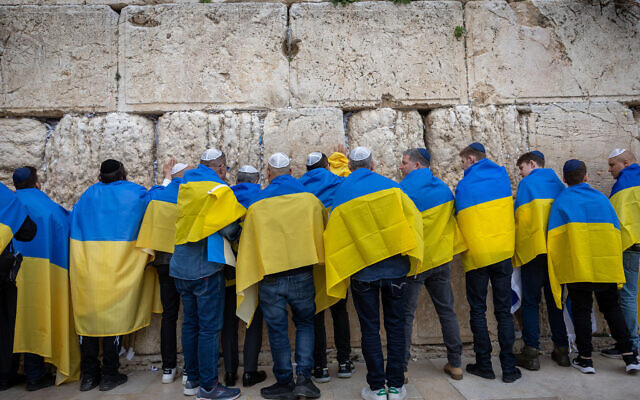
Ukraine’s ambassador to Israel, Yevgen Korniychuk, Ukrainian citizens and supporters attend a special prayer for the Ukrainian people organized by Businessman Arie Schwartz, at the Western Wall, in Jerusalem’s Old City, on March 2, 2022. (Yonatan Sindel/Flash90)
Korniychuk, part of whose family is currently in Ukraine, was visibly distraught and broke his diplomatic veneer to fault “the current leadership of Israel,” for not taking a more active hand in supporting Ukraine, saying, “if you had someone like Golda Meir or Jabotinsky, the results might be different.”
Israel has pointed to its neutral position as an asset that enabled Bennett to assist as a mediator between Kyiv and Moscow, but Korniychuk dismissed this as an excuse for not being more actively supported of Ukraine, following Russia’s February 24 invasion.
“I don’t think there’s any exclusivity there or any special role or position [held by] the Israeli government. So, saying that, ‘listen, we are mediators, that’s why we have to be neutral to both parties.’ That’s not the name of the game,” Korniychuk said.
As part of taking a clear pro-Ukrainian position, Korniychuk called on the Israeli government to join the Western-led sanctions imposed against Russia, and on private Israeli companies to end their business with Russian counterparts.
On Wednesday, Interior Minister Ayelet Shaked announced plans to allow a total of 5,000 Ukrainian refugee-seekers into Israel, along with permitting an estimated 20,000 Ukrainians who were in the country illegally before the war to stay. The majority of the 5,000 person quota has been filled, but the government canceled earlier demands for a NIS 10,000 ($3,082) bond per person. Ukrainians who qualify for Israeli citizenship under the right of return will be permitted to immigrate without restriction.
A number of Ukrainians seeking shelter in Israel — Korniychuk claimed “hundreds” — are still in status limbo, and have been held at Ben Gurion Airport under sparse conditions. On Thursday the government announced that these individuals, who still haven’t been formally admitted into the country, will be transported to a Tel Aviv hotel.
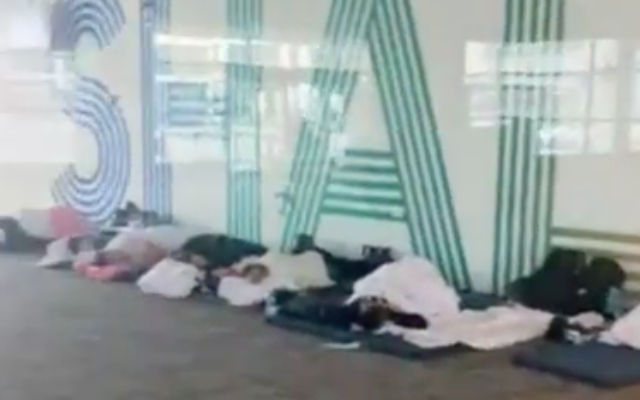
Screen capture from undated video showing Ukrainian refugees who were denied entry to Israel, in a holding area at Ben Gurion Airport. (Ynet)
“You don’t have to [flatter] yourself, Israel is not an easy country to come to because it is so expensive,” Korniychuk said. “Ninety percent of the people who are coming either have relatives or friends here that are asking [these] Ukrainians to come.”
“We very much hope that the Israeli government will hear our thoughts, they will listen to us, and they’ll find the solution on this matter which is very painful for us,” he said.
The conflict, which Korniychuk called “the biggest humanitarian crisis since World War II,” has created 2.3 million refugees, half of whom are children.
Korniychuk said that, according to Ukrainian estimates, 1,500 civilians have died, including 100 children. The ambassador highlighted that Ukraine’s military losses are “less than civilian losses in this brutal war,” as “Russia is purposely bombing civilian targets.”
He said his government estimates Russian casualties as higher, claiming “12,000 soldiers killed,” as well as 340 tanks, 50 aircraft, 81 helicopters, and 11,000 armed vehicles destroyed.
Ukrainian Foreign Minister Dmytro Kuleba and his Russian counterparty Sergey Lavrov met on Thursday in Turkey for the highest-level peace negotiations to date, which reportedly did not make significant progress.
Korniychuk said that although several mediation efforts are ongoing, none are promising.
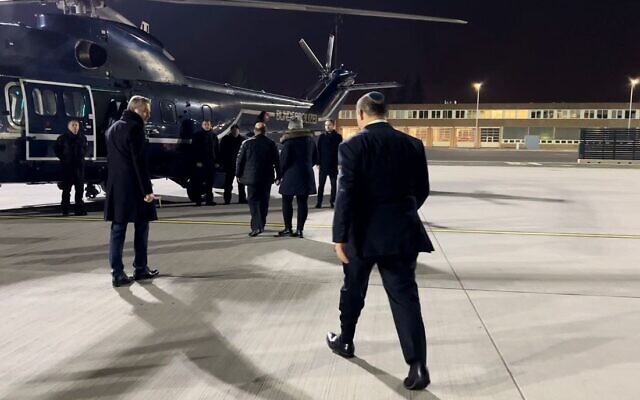
Prime Minister Naftali Bennett arrives in Germany for a meeting with Chancellor Olaf Scholz, on March 5, 2022. (PMO)
“This bloody war is going on, civilians and children are dying, and evacuation is going full speed ahead. That means that the mediation is not successful at the moment.”
Bennett made a rare Saturday trip to Moscow to meet with Russian President Vladimir Putin, and then engaged in a flurry of communication with Putin, Zelensky, and Western leaders. However, the last call between Zelensky and Bennett was on Tuesday.
Korniychuk didn’t directly answer a question on whether Israel is still playing a key role in facilitating dialogue between Moscow and Kyiv, but he said: “Israel doesn’t have any exclusivity on the mediation or intermediary process. And of course, we were asked by many leaders of the different states [for them] to be mediators,” the envoy said.
On Wednesday, Zelensky asked to address a session of Knesset, which Knesset Speaker Mickey Levy turned into an offer to host a Zoom call with parliamentarians instead, as the Knesset closed its winter session this week. Zelensky declined the offer, but Korniychuk said he and Levy’s office are in touch about correcting the gaffe.
“He has held speeches in the British Parliament, in the US Congress, and the members of Parliament and Congress stood up and applauded after his speech,” said Korniychuk, referring to Zelensky’s recent addresses to foreign governments. “I don’t think it’s a proper excuse that the Knesset members are on holiday, or some chairs in the office are under renovation.”
SPEAKER EARLIER SAID RECESS, RENOVATIONS, MADE IT IMPOSSIBLE
After rebuff, Zelensky to address Knesset members in coming days, says speaker
Date for speech via Zoom to be finalized; Ukrainian leader reportedly also asks to address Yad Vashem, museum says it will look into the matter
Date for speech via Zoom to be finalized; Ukrainian leader reportedly also asks to address Yad Vashem, museum says it will look into the matter
By TOI STAFF
10 March 2022
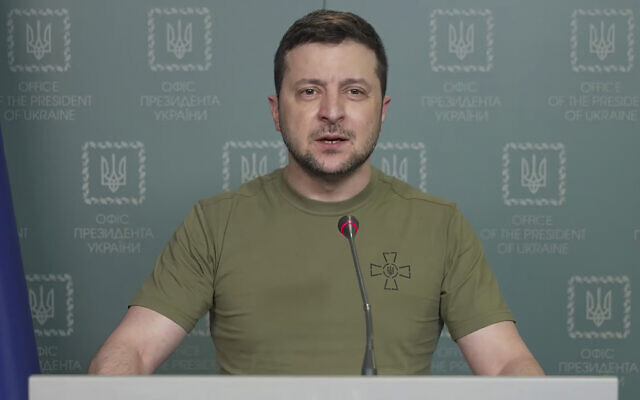
In this image from video provided by the Ukrainian Presidential Press Office and posted on Facebook, Ukrainian President Volodymyr Zelensky speaks in Kyiv, Ukraine, on Wednesday, March 9, 2022.

In this image from video provided by the Ukrainian Presidential Press Office and posted on Facebook, Ukrainian President Volodymyr Zelensky speaks in Kyiv, Ukraine, on Wednesday, March 9, 2022.
(Ukrainian Presidential Press Office via AP)
Ukrainian President Volodymyr Zelensky is slated to address the Israeli parliament via Zoom in the coming days, according to Knesset Speaker Mickey Levy.
Levy said on Thursday that he spoke with Ukrainian Ambassador to Israel Yevgen Korniychuk to reiterate his invitation to Zelensky to address members of the Knesset.
Korniychuk and Levy have agreed to schedule a date for Zelensky’s address in the coming days, the statement said.
Zelensky had first asked to address the full Knesset plenum, but Levy responded that the Knesset would be going on recess after its closing session on Thursday, and the building was then scheduled for renovations, according to reports.
“The ambassador thanked Speaker Levy for his welcoming response to his letter and for publicly clarifying and refuting the false information published in the press, that allegedly argued that the speaker refused President Zelensky’s request to address members of the Knesset,” the statement said.
Zelensky has given similar speeches to officials and lawmakers in the United Kingdom, European Union, and Canada.
However, hurdles reportedly remain. Asked by Korniychuk to ensure that most of the Knesset would be present for the speech, Levy said he could only control members of his own party, but predicted that most coalition members would attend, Israel’s Kan network reported.
According to the report, Levy’s office had feared having Zelensky give the speech to the actual Knesset plenum risked an embarrassing situation if a live broadcast showed a half-empty hall.
Separately, Reuters reported on Thursday that Zelensky asked to address the Yad Vashem Holocaust Memorial Museum to discuss Russia’s invasion of his country.
According to the report, Yad Vashem said in a statement that it will discuss the proposal with Ukraine’s ambassador to Israel.
There was no immediate comment from the Ukrainian embassy on the matter.
Relations between Israel and Ukraine have been tense since Russia launched its invasion, as Jerusalem attempts to walk a tightrope between Kyiv and Moscow, and Ukraine has sought more support.
Israel has avoided harshly criticizing Russia, or supporting Ukraine too strongly, because of Russia’s presence in Syria. Israel carries out airstrikes against Iran-linked targets in Syria, with Russia’s understanding, to prevent Iran-backed forces from gaining a foothold on Israel’s northern border.
Ukrainian President Volodymyr Zelensky is slated to address the Israeli parliament via Zoom in the coming days, according to Knesset Speaker Mickey Levy.
Levy said on Thursday that he spoke with Ukrainian Ambassador to Israel Yevgen Korniychuk to reiterate his invitation to Zelensky to address members of the Knesset.
Korniychuk and Levy have agreed to schedule a date for Zelensky’s address in the coming days, the statement said.
Zelensky had first asked to address the full Knesset plenum, but Levy responded that the Knesset would be going on recess after its closing session on Thursday, and the building was then scheduled for renovations, according to reports.
“The ambassador thanked Speaker Levy for his welcoming response to his letter and for publicly clarifying and refuting the false information published in the press, that allegedly argued that the speaker refused President Zelensky’s request to address members of the Knesset,” the statement said.
Zelensky has given similar speeches to officials and lawmakers in the United Kingdom, European Union, and Canada.
However, hurdles reportedly remain. Asked by Korniychuk to ensure that most of the Knesset would be present for the speech, Levy said he could only control members of his own party, but predicted that most coalition members would attend, Israel’s Kan network reported.
According to the report, Levy’s office had feared having Zelensky give the speech to the actual Knesset plenum risked an embarrassing situation if a live broadcast showed a half-empty hall.
Separately, Reuters reported on Thursday that Zelensky asked to address the Yad Vashem Holocaust Memorial Museum to discuss Russia’s invasion of his country.
According to the report, Yad Vashem said in a statement that it will discuss the proposal with Ukraine’s ambassador to Israel.
There was no immediate comment from the Ukrainian embassy on the matter.
Relations between Israel and Ukraine have been tense since Russia launched its invasion, as Jerusalem attempts to walk a tightrope between Kyiv and Moscow, and Ukraine has sought more support.
Israel has avoided harshly criticizing Russia, or supporting Ukraine too strongly, because of Russia’s presence in Syria. Israel carries out airstrikes against Iran-linked targets in Syria, with Russia’s understanding, to prevent Iran-backed forces from gaining a foothold on Israel’s northern border.
Zelensky requests speech to Knesset, gets offered Zoom chat instead
Ukrainian president sought to drum up support with Israeli lawmakers but was told they are going on recess, and the building is scheduled for renovations
By TOI STAFF
Ukrainian president sought to drum up support with Israeli lawmakers but was told they are going on recess, and the building is scheduled for renovations
By TOI STAFF
10 March 2022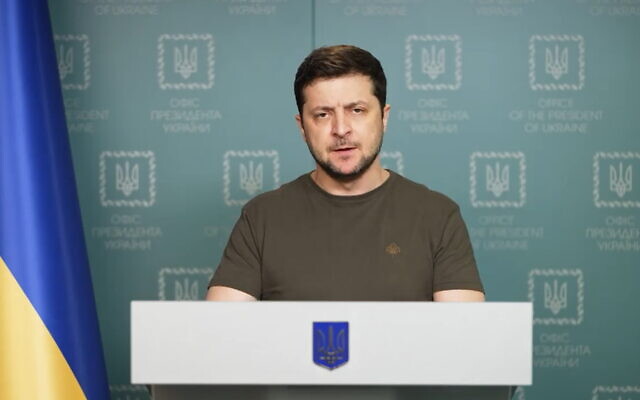
Ukraine's President Volodymyr Zelensky in a video address posted to Facebook, on March 4, 2022. (Screenshot)
Ukrainian President Volodymyr Zelensky sought to give an address to the Knesset to drum up support for Ukraine’s war effort, but was offered a smaller discussion with fewer lawmakers, according to Wednesday reports.
The Ukrainians were disappointed with the offer and did not accept it, the reports said.
Zelensky wanted to deliver an address via remote video to the Knesset’s plenum to present Ukraine’s plight during the Russian invasion, the Walla and Ynet news sites reported.
Zelensky has given similar speeches to officials and lawmakers in the United Kingdom, European Union and Canada.
Ukraine’s ambassador to Israel, Yevgen Korniychuk, filed a request for the speech with Knesset speaker Mickey Levy, who said the matter was complicated, since the Knesset is beginning its recess on Thursday, so a special meeting would have to be called.
Levy said convening the Knesset would not be possible, and suggested to Korniychuk that Zelensky hold a smaller Zoom discussion with some Knesset members, but not the full plenum, Walla reported, citing a senior official.
Levy’s office contacted the Foreign Ministry to check whether there were any diplomatic issues regarding a potential call with Zelensky, and the ministry said it had no objections, the report said.

Knesset Speaker Mickey Levy seated in the Knesset in Jerusalem, on January 17, 2022. (Yonatan Sindel/Flash90)
The Ukrainians were not interested in Levy’s suggestion for a Zoom talk, seeing the offer as disrespectful. They were hoping Zelensky could speak on a bigger platform and were disappointed with the offer, the report said.
Some lawmakers supported hosting a speech from Zelensky.
Yisrael Beytenu’s Eli Avidar sent a letter to Levy requesting the full plenum convene for Zelensky, or that he be given a call with Israel’s foreign and defense committees.
Labor lawmaker Ibtisam Mara’ana said, “Ready at any time and any hour to welcome and hear Zelensky in the Knesset.”
Levy said in response that the Knesset would be “honored” to have an address from Zelensky, but that the Knesset is going on recess on Thursday, and the building is scheduled for renovations, so Zelensky was invited “for a remote speech with Knesset members in an official video call.”
Relations between Israel and Ukraine have been tense since Russia launched its invasion, as Jerusalem attempts to walk a tightrope between Kyiv and Moscow, and Ukraine has sought more support.
Israel has avoided harshly criticizing Russia, or supporting Ukraine too strongly, because of Russia’s presence in Syria. Israel carries out airstrikes against Iran-linked targets in Syria, with Russia’s understanding, to prevent Iran-backed forces from gaining a foothold on Israel’s northern border.
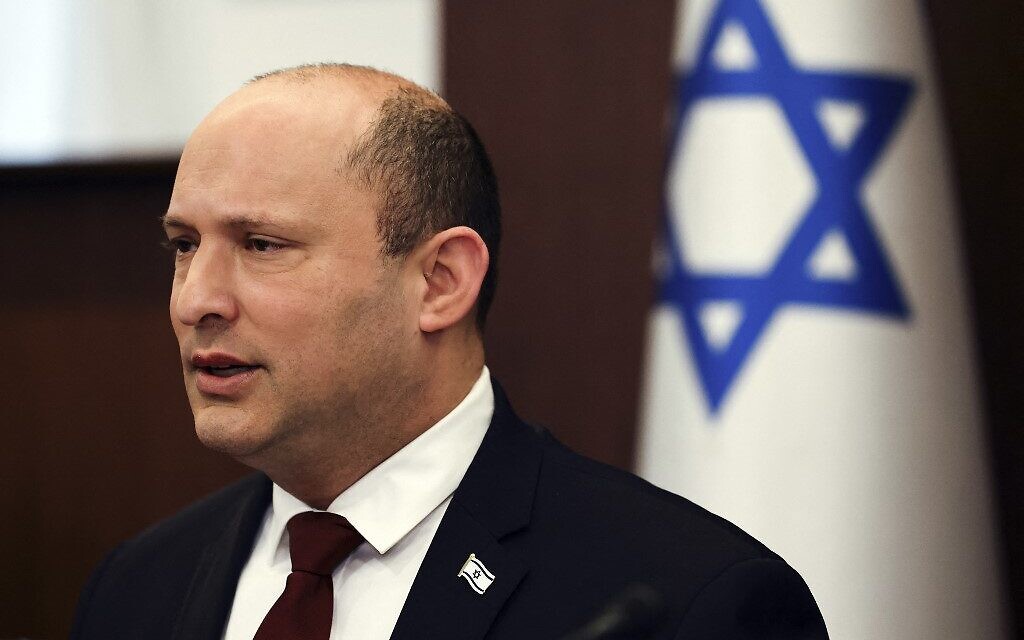
Prime Minister Naftali Bennett leads a cabinet meeting at the Prime Minister’s Office in Jerusalem on March 6, 2022. (Ronen Zvulun/Pool/AFP)
Prime Minister Naftali Bennett has tried to mediate between Kyiv and Moscow, since Israel is in a unique position, with good relations with both sides of the war, and with Western countries.
Ukrainian officials have thanked Israel for its mediation attempts as well as for sending humanitarian aid to civilians fleeing the country, but Zelensky also criticized Bennett last week, saying he felt the premier was not “wrapped in our flag,” a reference to a photo showing Israeli men wrapped in Ukrainian flags at the Western Wall, alongside the Ukrainian ambassador to Israel.
While Foreign Minister Yair Lapid has condemned the Russian invasion of Ukraine, Bennett has not done so. Israel declined a US request to sponsor a UN Security Council resolution condemning the invasion last month; it did support the subsequent General Assembly resolution to do so.
Kyiv’s ambassador to Israel has repeatedly lamented Israel’s refusal to send military protective gear for Ukrainian troops, let alone weaponry.
Israel sent “a stiff message” to Ukraine in the past day, protesting that it was being criticized by Kyiv even as it tries to mediate a deal, and saying that this situation was intolerable, Channel 12 news reported Tuesday.

Ukraine's President Volodymyr Zelensky in a video address posted to Facebook, on March 4, 2022. (Screenshot)
Ukrainian President Volodymyr Zelensky sought to give an address to the Knesset to drum up support for Ukraine’s war effort, but was offered a smaller discussion with fewer lawmakers, according to Wednesday reports.
The Ukrainians were disappointed with the offer and did not accept it, the reports said.
Zelensky wanted to deliver an address via remote video to the Knesset’s plenum to present Ukraine’s plight during the Russian invasion, the Walla and Ynet news sites reported.
Zelensky has given similar speeches to officials and lawmakers in the United Kingdom, European Union and Canada.
Ukraine’s ambassador to Israel, Yevgen Korniychuk, filed a request for the speech with Knesset speaker Mickey Levy, who said the matter was complicated, since the Knesset is beginning its recess on Thursday, so a special meeting would have to be called.
Levy said convening the Knesset would not be possible, and suggested to Korniychuk that Zelensky hold a smaller Zoom discussion with some Knesset members, but not the full plenum, Walla reported, citing a senior official.
Levy’s office contacted the Foreign Ministry to check whether there were any diplomatic issues regarding a potential call with Zelensky, and the ministry said it had no objections, the report said.

Knesset Speaker Mickey Levy seated in the Knesset in Jerusalem, on January 17, 2022. (Yonatan Sindel/Flash90)
The Ukrainians were not interested in Levy’s suggestion for a Zoom talk, seeing the offer as disrespectful. They were hoping Zelensky could speak on a bigger platform and were disappointed with the offer, the report said.
Some lawmakers supported hosting a speech from Zelensky.
Yisrael Beytenu’s Eli Avidar sent a letter to Levy requesting the full plenum convene for Zelensky, or that he be given a call with Israel’s foreign and defense committees.
Labor lawmaker Ibtisam Mara’ana said, “Ready at any time and any hour to welcome and hear Zelensky in the Knesset.”
Levy said in response that the Knesset would be “honored” to have an address from Zelensky, but that the Knesset is going on recess on Thursday, and the building is scheduled for renovations, so Zelensky was invited “for a remote speech with Knesset members in an official video call.”
Relations between Israel and Ukraine have been tense since Russia launched its invasion, as Jerusalem attempts to walk a tightrope between Kyiv and Moscow, and Ukraine has sought more support.
Israel has avoided harshly criticizing Russia, or supporting Ukraine too strongly, because of Russia’s presence in Syria. Israel carries out airstrikes against Iran-linked targets in Syria, with Russia’s understanding, to prevent Iran-backed forces from gaining a foothold on Israel’s northern border.

Prime Minister Naftali Bennett leads a cabinet meeting at the Prime Minister’s Office in Jerusalem on March 6, 2022. (Ronen Zvulun/Pool/AFP)
Prime Minister Naftali Bennett has tried to mediate between Kyiv and Moscow, since Israel is in a unique position, with good relations with both sides of the war, and with Western countries.
Ukrainian officials have thanked Israel for its mediation attempts as well as for sending humanitarian aid to civilians fleeing the country, but Zelensky also criticized Bennett last week, saying he felt the premier was not “wrapped in our flag,” a reference to a photo showing Israeli men wrapped in Ukrainian flags at the Western Wall, alongside the Ukrainian ambassador to Israel.
While Foreign Minister Yair Lapid has condemned the Russian invasion of Ukraine, Bennett has not done so. Israel declined a US request to sponsor a UN Security Council resolution condemning the invasion last month; it did support the subsequent General Assembly resolution to do so.
Kyiv’s ambassador to Israel has repeatedly lamented Israel’s refusal to send military protective gear for Ukrainian troops, let alone weaponry.
Israel sent “a stiff message” to Ukraine in the past day, protesting that it was being criticized by Kyiv even as it tries to mediate a deal, and saying that this situation was intolerable, Channel 12 news reported Tuesday.
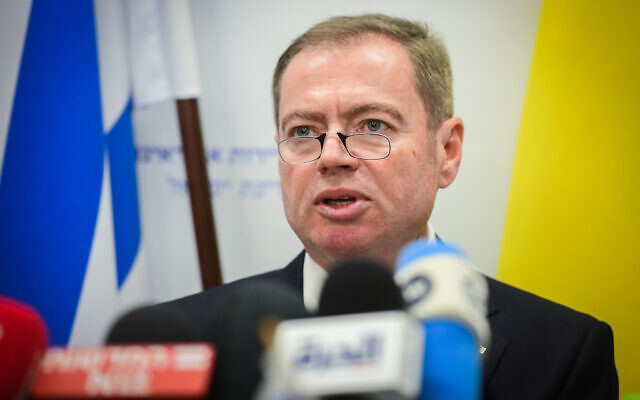
No comments:
Post a Comment